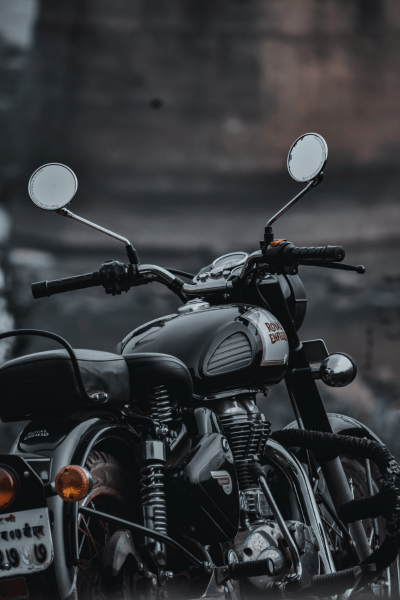THE RIGHT WAY TO PREPARE
Your Guide to Acing the New Brunswick Motorcycle Test
 So you’re eyeing the open road in New Brunswick, ready to rev up your bike and feel the breeze. Before that freedom is yours, a crucial step is passing the motorcycle test. This guide lays it all out for you—the what’s what of the exam, how to qualify, and key topics you’ll face.
So you’re eyeing the open road in New Brunswick, ready to rev up your bike and feel the breeze. Before that freedom is yours, a crucial step is passing the motorcycle test. This guide lays it all out for you—the what’s what of the exam, how to qualify, and key topics you’ll face.
We’ve got study tips lined up, too, because achieving this isn’t just about luck; it’s strategy. Plus, understanding safety rules does more than help pass tests—it keeps you alive on those winding roads. And don’t sweat test day; we’ll walk through what to expect so nerves won’t ride shotgun.
Avoid common slip-ups with our insider advice and look beyond passing—what comes next? We cover everything from hitting actual traffic with your Class 6 license to advanced training options.
Understanding the New Brunswick Motorcycle Test
If you’ve ever dreamed of cruising through New Brunswick’s scenic routes on two wheels, acing your motorcycle test is where the rubber meets the road. The exam isn’t just a hurdle; it’s the gateway to open highways and wind-in-your-hair freedom.
Structure of the Test
The test is multiple-choice, making it as straightforward as shifting gears. You’ll tackle questions designed to gauge your knowledge of riding rules and regulations—stuff that keeps you safe on epic rides. But don’t be fooled by the simplicity; each question packs a punch like a bike at full throttle.
You can prep with an online New Brunswick motorcycle practice test, mimicking the real deal to every detail.
Types of Questions Asked
A deep dive into traffic signs? Check. A rundown on safety gear? Double-check. The questions will cover everything from helmet laws to handling hazardous weather conditions—not exactly trivia night topics, but crucial for any rider worth their salt (or should we say asphalt?). This isn’t no pop quiz—it’s about keeping all riders alive and kicking.
Scoring System Explained
This part is simple: answer correctly or park it. Each correct response gets you closer to passing marks—and that much closer to joining New Brunswick’s League of Extraordinary Riders. It might not be rocket science, but even small missteps can mean another round before you get those keys jingling in your pocket.
So grab your study materials because this test could make or break your two-wheeled dreams. Just picture crossing that finish line: no more learner plates holding back those horsepower-fueled adventures waiting around the corner.
Remember, folks, when prepping for this ride-of-passage—the devil’s in details, so hit those books hard and show up ready to rule the road.
Eligibility Criteria for the New Brunswick Motorcycle Test
Do you have what it takes to rule the road on two wheels in New Brunswick? Before you rev your engines, there’s a checklist of must-haves and gotta-dos. So buckle up—here’s the lowdown on qualifying for that all-important motorcycle test.
Remember, getting geared up to pass the motorcycle knowledge exam means checking these boxes off first. After ticking them away, strap your helmet tight because adventure awaits ahead. With the right preparation and confidence sky-high, success is yours to grab. Happy riding.
Age Restrictions
More Than Just a Number
Age matters if you’re itching to hit the open road with handlebars at your fingertips. It would be best if you were at least 16 years old. But hold your horses—if you’re under 18, bring parental consent because it’s not just about feeling like Easy Rider; safety comes first.
To legally ride solo in New Brunswick without training wheels (figuratively speaking), anyone under 18 needs their guardian to say “yes” by signing off on their application form. It shows responsibility and ensures everyone is cool with this next step into motorcycling adulthood.
Learner’s Permit
Your Golden Ticket
A learner’s permit isn’t just another piece of plastic—it’s your golden ticket. To get one, passing a written knowledge test focused on motorcycle safety rules is a non-negotiable Motorcycle License Class 6. Study hard and ace those questions; they’re stepping stones towards riding freedom.
This permit doesn’t mean immediate full-throttle liberty; restrictions apply while learning ropes—or roads in this case—but hey, every pro was once a beginner, too.
Paperwork Parade
What You’ll Need to Bring Along
You won’t go far without proper documentation when it comes time for the testing day—and I’m not talking about bringing an epic mixtape for after-test celebrations (although that sounds like fun.). Ensure these documents are ready:
ID Verification: Show who you are loud and clear—a government-issued ID should do the trick nicely.
Evidence of Legal Presence: If Canada isn’t officially home sweet home, make sure proof says otherwise legally.
Key Topics Covered in the New Brunswick Motorcycle Practice Test
Consider it a roadmap when you’re gearing up for the New Brunswick motorcycle practice test. You wouldn’t start a journey without knowing your route. The same goes for this test; you’ve got to know what’s coming. And I’m here to give you that sneak peek.
Road Rules and Regulations
The meat and potatoes of any driving test are the road rules. In New Brunswick, they don't skimp on them for motorcyclists. Expect questions about everything from traffic lights and signs to those tricky four-way stops where everyone seems hesitant to move first.
Beyond "who goes when," there'll be bits about speed limits—because let’s face it, sometimes throttles have minds of their own—and how closely you can follow another vehicle without being considered tailgating (spoiler alert: not too close).Safety Gear Requirements
Have you ever heard someone say 'dress for success'? Well, in motorcycling terms, that means dressing not just for the ride but also in case things go sideways... literally. The practice tests will quiz you on helmet laws that keep your noggin safe, eye protection because bugs at 60 mph hurt like heck, and other gear to protect your skin from taking an unwilling tour across the asphalt.
Maintenance Know-How
Last but not least is maintenance knowledge—think tire pressure checks before rides or chain lubrication after muddier adventures (yes, motorcycles need love, too.). These might seem minor next to road rule regulations,
but imagine asking every sign question only to flop on something as simple as checking oil levels—it happens more than people care to admit.THE RIGHT CHOICE
Study Tips for Passing the Motorcycle Knowledge Test
Cracking the New Brunswick Motorcycle Knowledge Test is like mastering a new recipe – you must get your ingredients and steps right. The key ingredient? A solid study plan that’s more than just flipping through pages.
A good starting point is familiarizing yourself with Service New Brunswick’s motorcycle handbook. This guide dishes everything from road rules to handling emergencies, like a master chef sharing secret techniques. But don’t stop there. Diversify your prep by tapping into online practice tests; they’re a treasure trove of insights, showing you where you shine and what needs polish.
Create Your Study Roadmap
Schedule study sessions as if they’re pit stops on your ride to success. Map out daily or weekly goals, but keep them realistic – think of short bursts of focused learning rather than marathon cramming sessions that'll leave you exhausted.
Then sprinkle in different formats: flashcards for quick reviews, diagrams for understanding mechanics, and even audio recordings to reinforce traffic laws while on the go. Mixing it up keeps things fresh because who wants a one-flavor meal?
Leverage Practice Tests Like Pro Gear
Riding gear protects; practice tests prepare - both are non-negotiables. By regularly taking timed practice exams, you’ll gauge how well-prepared you are and get comfortable with the test format – speed bumps included.
Dive deep into each wrong answer (yep, embrace those face-palm moments) because every error spotted now is one less hurdle during showtime.
Formulate Quick Reference Sheets
You wouldn’t tour without checking your bike first; treat revisions similarly by crafting quick reference sheets summarizing critical points such as signage meanings or braking techniques—like an essential toolkit tucked under your seat for easy access when needed most.
This handy summary acts as both a revision aid before D-day and last-minute glance material right before entering the test center - calm nerves guaranteed.
The Importance of Understanding Motorcycle Safety Rules
Knowing the ins and outs of motorcycle safety rules is like having a guardian angel on your shoulder every time you hit the road. It’s not just about acing that New Brunswick Motorcycle Test; it’s life-saving know-how in your biker toolkit.
Think about it: motorcycles are thrilling but don’t have metal cocoon-like cars. So, these rules? They’re your armor against the unpredictable asphalt jungle. Every throttle twist should be backed by wisdom from countless miles ridden and lessons learned.
And here’s something to chew on: stats show riders without helmets are 40% more likely to suffer a fatal head injury in a crash and three times more likely to have brain injuries than those with helmets, according to CDC research. That helmet rule doesn’t sound so pesky now.
Road Sharing Skills
 Mixing it up with cars requires serious street smarts—like knowing how to claim your space on the road while staying visible. Because let’s face it, sometimes drivers treat motorcyclists like we’re invisible. Staying aware of blind spots, signaling intentions early, and mastering defensive driving techniques can make all the difference between a close call and an unwanted tumble.
Mixing it up with cars requires serious street smarts—like knowing how to claim your space on the road while staying visible. Because let’s face it, sometimes drivers treat motorcyclists like we’re invisible. Staying aware of blind spots, signaling intentions early, and mastering defensive driving techniques can make all the difference between a close call and an unwanted tumble.
You’ve got this, though. After diving into safety strategies during test prep for questions about safely sharing the road, a little practice will turn you into a two-wheeled traffic ninja.
Navigating Weather Woes
Bikers need weather-forecasting skills rivaling that local TV meteorologist—we’ve all been there when clear skies suddenly betray us with downpours or gusty winds out of nowhere. Your study sessions will cover handling these curveballs because Mother Nature sure isn’t taking any tests before she decides to shake things up.
Arming yourself with knowledge means less shivering through showers or wrestling crosswinds—and more enjoying what bikers love most: riding free under open skies (with proper gear.).
Laws Are There For Love, Not Just Tickets
Last but not least is understanding laws aren’t buzzkills—they’re lifesavers wrapped in legalese (Transport Canada backs this up big time). By learning speed limits aren’t arbitrary numbers but carefully calculated guidelines designed for everyone’s well-being—including yours—you’ll see signs as helpful hints rather than hindrances.
Sure, no one dreams about studying traffic laws at night—but think of them as cheat codes giving you an edge over the chaos every ride promises.
A SIMPLE, FUN WAY TO PREPARE
Test Day Procedures and What to Expect
You’ve got your gear ready and been studying hard, and the big day is finally here. The New Brunswick Motorcycle Test stands between you and the open road. But don’t sweat it. Knowing what’s coming can help ease those test-day jitters.
Checking In: Your First Hurdle
The check-in process is straightforward but vital. Arrive early; this isn't a fashionably late scenario—punctuality shows you're serious about earning your wings (or wheels). Bring valid identification because they'll want to make sure you are who you say you are. Without ID, it’s like trying to get into an exclusive club wearing flip-flops—you’re just not getting in.
No one likes paperwork on an empty stomach, so grab a bite before heading out—the brain works best when fueled.Navigating Identification Verification Like A Pro
Pull out that ID with confidence—it’s showtime. They’ll scrutinize it more than a bouncer does at the hottest club in town. So ensure all details are up-to-date because outdated info could send you back home faster than a U-turn sign on a dead-end street.
A quick tip: If your nerves feel like revved-up engines, take deep breaths—they're nature's built-in stress reliever.Conquering Test-Taking Anxiety: It’s All Mental Gymnastics
Anxiety can hit harder than a pothole on smooth asphalt—but remember, preparation breeds confidence. You’ve done practice tests online and studied diligently; now trust yourself to stick to the landing.
Before entering battle against those multiple-choice questions, think of something calming—a sunset ride or cruising down coastal roads—to get into the right headspace for victory.Common Mistakes to Avoid on the New Brunswick Motorcycle Test
Sailing through the New Brunswick motorcycle test might seem like a breeze for some, but even seasoned riders can hit a snag if they’re not careful. So, what’s tripping up most folks? Let’s get into it.
Overlooking Road Sign Nuances
You know your stop signs from yield signs, right? But sometimes, the devil is in the details. A common slip-up is missing subtle differences between similar-looking road signs or forgetting how specific rules apply in varied situations. Make sure you give those practice tests more than just a once-over—get cozy with every curve and corner of road sign knowledge.
If you've ever mixed up metric and imperial units (who hasn't?), remember that Canada loves its kilometers. This tiny mix-up could lead to major misunderstandings about speed limits and distance measurements on the test.
Ignoring Those Tricky Situational Questions
Riders often mess up when faced with "What would you do?" scenarios during their written exams. Studying isn’t just memorizing facts; it's visualizing real-life applications, too. Dive deep into possible on-the-road dilemmas because knowing how to handle them can be as crucial as knowing your ABCs—or should we say ABS?
The trick here is to think about what’s legal and what’s safe for everyone sharing the road with you. Think less black-and-white and more shades of grey- well, maybe not fifty.
Glossing Over Maintenance Knowledge
A motorbike isn’t going anywhere without TLC—that means tender loving care for both bike newbies and pros alike. Underestimating maintenance questions have been the downfall of many riders. It's not enough to look cool in leather; make sure that ride is purring perfectly by studying motorcycle upkeep.
Burn this into your brain: safety starts before hitting throttle heaven—checking tire pressure, brake function, and signal lights are all fair game for examiners looking to trip you up.
Next Steps After Passing Your New Brunswick Motorcycle Knowledge Test
Congrats. You’ve aced the New Brunswick Motorcycle Knowledge Test. But before you hit the open road, there’s more to do to ensure your riding adventures are legal and safe.
 Schedule Your Road Tests
Schedule Your Road Tests
The first thing on your checklist is booking those all-important road tests. Start with the basic handling skills test—think of it a ballet for bikes, where precision meets the pavement. Once you have that down pat, move onto the on-road test—a real-world dance with traffic laws and safety measures in place.
You can book these through Service New Brunswick or via their online portal. Remember, practice makes perfect.
Get That Class 6 License
Paperwork time. Getting your motorcycle Class 6 license means filling out forms and proving that the knowledge test wasn’t just luck. Bring your ID and proof of passing your written exam, and get ready to smile for an epic photo at any Service NB location.
Check out their official requirements page for full details on what documents you must bring for this rite of passage into bikerhood.
Consider Advanced Rider Training Courses
If wisdom came with wheels, we’d all be riding philosophers by now—but since it doesn’t, let’s talk advanced training courses. These sessions are like leveling up in a video game; they give you extra skills that could save lives—including yours.
New Brunswick Safety Council offers some top-notch options worth checking out right here. They will boost confidence and potentially lower insurance rates—a win-win situation.
Riding off into the sunset feels even better when you’re fully prepped and legitimized—it’s about embracing freedom while tethered securely to responsibility, after all.

 Schedule Your Road Tests
Schedule Your Road Tests